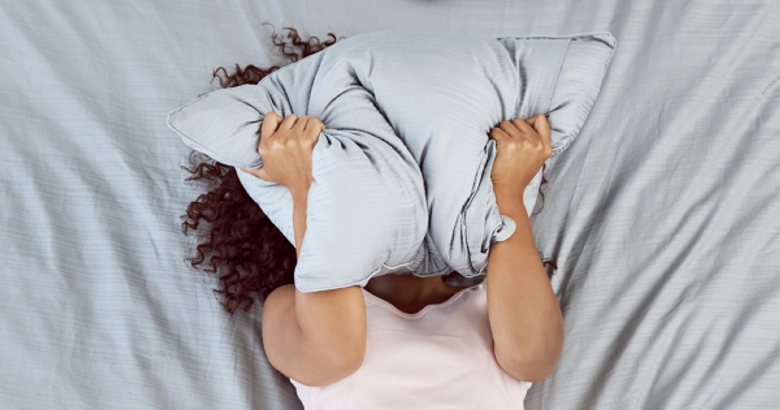
There isn’t anything more annoying than sleeping deeply and waking up multiple times throughout the night. Whether you find yourself staring at your clock, battling anxiety, or waking up frequently to use the bathroom, getting a peaceful night’s rest can feel like an uphill battle. But not to worry, we’ll discuss several ways to stop waking up at night so you can wake up refreshed and happy.
7 Common Reasons for Night Wake-Ups
While it’s normal to wake up every night once or twice, if you’re struggling with frequent wake-ups that’s causing sleep deprivation and disruptions to your day-to-day, there might be a few reasons that explain why.
- Health condition. Various health conditions like the common cold, diabetes, kidney disease, and thyroid disease, to name a few, can all disturb even the deepest of sleepers. Additionally, consistently waking up could be a symptom of insomnia, sleep apnea, or restless leg syndrome.
- Aging. As we age, we become more vulnerable to inconsistent sleep.
- Mental health. Stress, anxiety, and depression can all impact your sleep and cause insomnia or lighter sleep.
- Medications. Be mindful of your medications because some can produce stimulating effects or suppress melatonin.
- Hormones. Menstruation, pregnancy, perimenopause, and menopause can cause your hormones to spike or drop, impacting your sleep.
- Environment. If your environment is noisy or uncomfortable, you may struggle to get the zzz’s you need.
- Lifestyle. Studies reported smokers have poorer sleep quality, including those who drink coffee or alcohol.
10 Tips To Stop Waking Up At Night
1. Make your bedroom comfortable
A part of eliminating frequent wakeups is looking at how every aspect of our lives affects our sleep. For example, if you work in your bedroom, your bed can become associated with your wake periods. As a result, you may find it challenging to ease into sleep mode at bedtime. But if you work on keeping the two separate and creating a peaceful sleep sanctuary by eliminating noise and light, you will be able to relax. Your body will become conditioned to know your bedroom is an environment for sleeping.
2. Follow a bedtime routine
If you struggle to fall asleep, implementing and following a bedtime routine can change things around. A bedtime routine is a set of activities you complete 30 to 60 minutes before bed. For example, while winding down, you may drink chamomile tea while reading a book, meditate for ten minutes, and complete a few stretches before hitting the hay. And your personal routine will also be effective at helping you how to stop catastrophizing by shifting your mind and encouraging you to relax.
3. Address the source of your stress
One of the best tips to stop waking up at night is to address your stress. Indeed, stress causes a vicious cycle. It causes anxiety, which produces more sleep disruptions and, in turn, creates more anxiety about not sleeping and so forth. But when you work on what’s causing your stress during your wake periods and learn how to reduce stress naturally, you’ll sleep deeper and more peacefully.
4. Work on the mind
When anxiety or stress are the main villains keeping you awake, work on feeling more relaxed to sleep better. For example, if you struggle with waking up consistently, you may develop a fear that you’ll never sleep again. While irrational, your anxiety might be feeding this fear. Therefore, while preparing for bed, learn how to challenge your thoughts by accepting that you have the fear and then gently remind yourself, it’s your anxiety speaking, not a predictor of how your night’s sleep will go. Over time, you will develop a habit of not believing every concern your brain creates.
5. Make exercise a priority
While exercising too close to bed will produce the reserve effect, exercising throughout the day will prevent waking up regularly. Why? Science has the answer. For starters, exercise increases the production of melatonin, your sleep hormone that regulates your circadian rhythm and promotes restful sleep. It also increases the amount of slow wave; your deep sleep. So, throughout the day, prioritize your movement of choice, whether it’s yoga, weightlifting, running, or even walking.
6. Avoid stimulants
Caffeine, alcohol, and nicotine are all stimulants that interfere with sleep. So, to ensure you get a better night’s rest, avoid caffeine at least 6 hours prior to bed, and only have one alcoholic drink several hours beforehand. And consider practicing ways to resist tobacco cravings to positively impact your mental and physical health. Yet if your love of coffee is too intense to forgo 6 hours, try alternative sources to jumpstart your energy.
7. Minimize bathroom breaks
Many culprits cause frequent nighttime urination; too much water, diabetes, caffeine, etc. But there is another reason; your circadian rhythm. Throughout the 24-cycle, we release a hormone called vasopressin which maintains hydration and reduces urination. However, if your rhythm is off, you may not be releasing adequate amounts, causing more trips to the bathroom. Therefore, try to stick to a regular sleeping schedule and reduce your water intake at least two hours before bed.
8. Wake up at the same time
Some days you may feel the urge to stay up past your bedtime and binge a little Netflix. But to reset your circadian rhythm for better sleep, try to go to sleep and wake up at the same time every day. When you do this, your body is able to function more efficiently, maintaining a healthier system and keeping you well-rested, energized, and happy.
9. Get your daily vitamin D
Did you know vitamin D plays a role in your sleep regulation? It’s true. Specifically, a deficiency in the sunshine vitamin increases your vulnerability to sleep disorders and inconsistent sleep. Therefore, make sure you are getting your required amount. Whether you take a supplement or go for a long walk through the day, prioritize your daily vitamin D.
10. Wear blue light glasses
While scrolling or working before bed is never a good idea, wear blue light glasses if you can’t resist the urge. The light emitted from your screen can disrupt your natural melatonin production. Yet wearing blue light glasses is your trusty sidekick in protecting your circadian rhythm and ensuring a better night’s rest.
If you continue to struggle with frequent wake-ups, speak with a doctor. They will help address the underlying reasons for your anxiety or insomnia to help you receive the best treatment for your particular situation. In addition, follow a few of these to stop waking up at night to help ease your stress, prepare your body for bed, and help you receive the peaceful night’s sleep you deserve.
This post contains affiliate links.
If you found this collection of tips to stop waking up at night helpful, please share this post on Pinterest!
And if you’re looking for more health tips, please follow our Health board where we share all kinds of helpful ideas we find each day!








